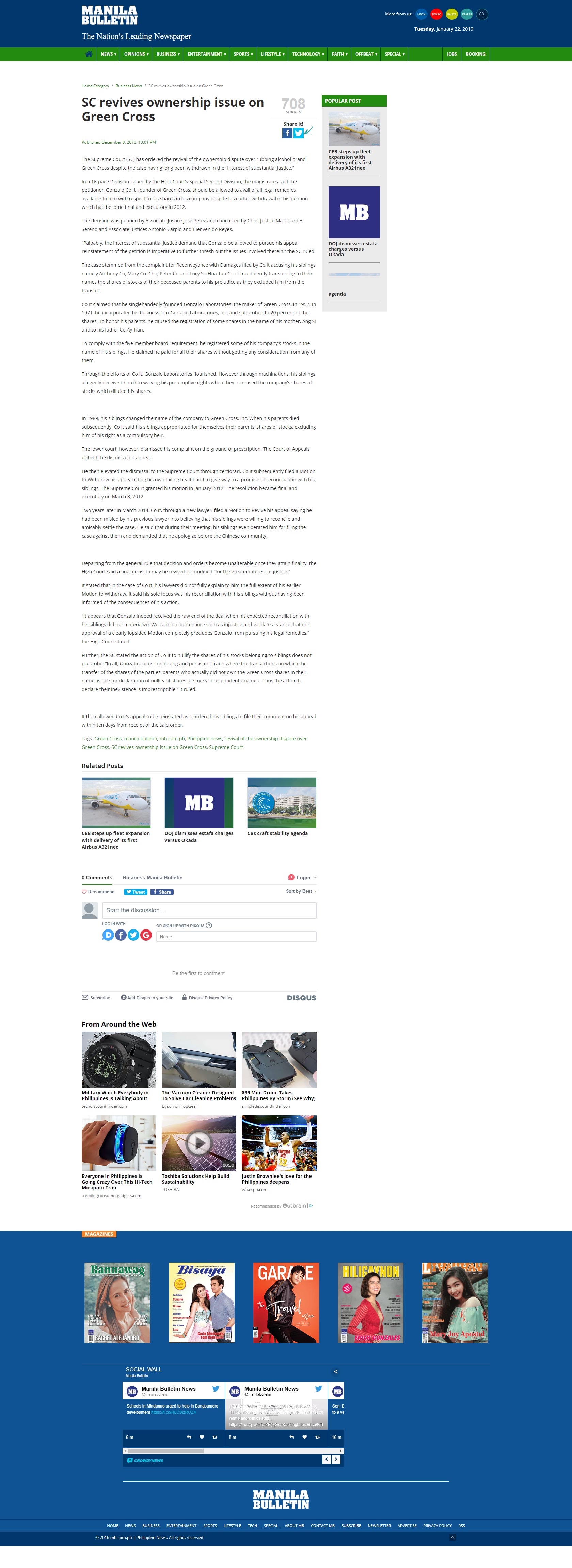The Supreme Court (SC) has ordered the revival of the ownership dispute over rubbing alcohol brand Green Cross despite the case having long been withdrawn in the “interest of substantial justice.”
In a 16-page Decision issued by the High Court’s Special Second Division, the magistrates said the petitioner, Gonzalo Co It, founder of Green Cross, should be allowed to avail of all legal remedies available to him with respect to his shares in his company despite his earlier withdrawal of his petition which had become final and executory in 2012.
The decision was penned by Associate Justice Jose Perez and concurred by Chief Justice Ma. Lourdes Sereno and Associate Justices Antonio Carpio and Bienvenido Reyes.
“Palpably, the interest of substantial justice demand that Gonzalo be allowed to pursue his appeal, reinstatement of the petition is imperative to further thresh out the issues involved therein,” the SC ruled.
The case stemmed from the complaint for Reconveyance with Damages filed by Co It accusing his siblings namely Anthony Co, Mary Co Cho, Peter Co and Lucy So Hua Tan Co of fraudulently transferring to their names the shares of stocks of their deceased parents to his prejudice as they excluded him from the transfer.
Co It claimed that he singlehandedly founded Gonzalo Laboratories, the maker of Green Cross, in 1952. In 1971, he incorporated his business into Gonzalo Laboratories, Inc. and subscribed to 20 percent of the shares. To honor his parents, he caused the registration of some shares in the name of his mother, Ang Si and to his father Co Ay Tian.
To comply with the five-member board requirement, he registered some of his company’s stocks in the name of his siblings. He claimed he paid for all their shares without getting any consideration from any of them.
Through the efforts of Co It, Gonzalo Laboratories flourished. However through machinations, his siblings allegedly deceived him into waiving his pre-emptive rights when they increased the company’s shares of stocks which diluted his shares.
In 1989, his siblings changed the name of the company to Green Cross, Inc. When his parents died subsequently, Co It said his siblings appropriated for themselves their parents’ shares of stocks, excluding him of his right as a compulsory heir.
The lower court, however, dismissed his complaint on the ground of prescription. The Court of Appeals upheld the dismissal on appeal.
He then elevated the dismissal to the Supreme Court through certiorari. Co It subsequently filed a Motion to Withdraw his appeal citing his own failing health and to give way to a promise of reconciliation with his siblings. The Supreme Court granted his motion in January 2012. The resolution became final and executory on March 8, 2012.
Two years later in March 2014, Co It, through a new lawyer, filed a Motion to Revive his appeal saying he had been misled by his previous lawyer into believing that his siblings were willing to reconcile and amicably settle the case. He said that during their meeting, his siblings even berated him for filing the case against them and demanded that he apologize before the Chinese community.
Departing from the general rule that decision and orders become unalterable once they attain finality, the High Court said a final decision may be revived or modified “for the greater interest of justice.”
It stated that in the case of Co It, his lawyers did not fully explain to him the full extent of his earlier Motion to Withdraw. It said his sole focus was his reconciliation with his siblings without having been informed of the consequences of his action.
“It appears that Gonzalo indeed received the raw end of the deal when his expected reconciliation with his siblings did not materialize. We cannot countenance such as injustice and validate a stance that our approval of a clearly lopsided Motion completely precludes Gonzalo from pursuing his legal remedies,” the High Court stated.
Further, the SC stated the action of Co It to nullify the shares of his stocks belonging to siblings does not prescribe. “In all, Gonzalo claims continuing and persistent fraud where the transactions on which the transfer of the shares of the parties’ parents who actually did not own the Green Cross shares in their name, is one for declaration of nullity of shares of stocks in respondents’ names. Thus the action to declare their inexistence is imprescriptible,” it ruled.
It then allowed Co It’s appeal to be reinstated as it ordered his siblings to file their comment on his appeal within ten days from receipt of the said order.


